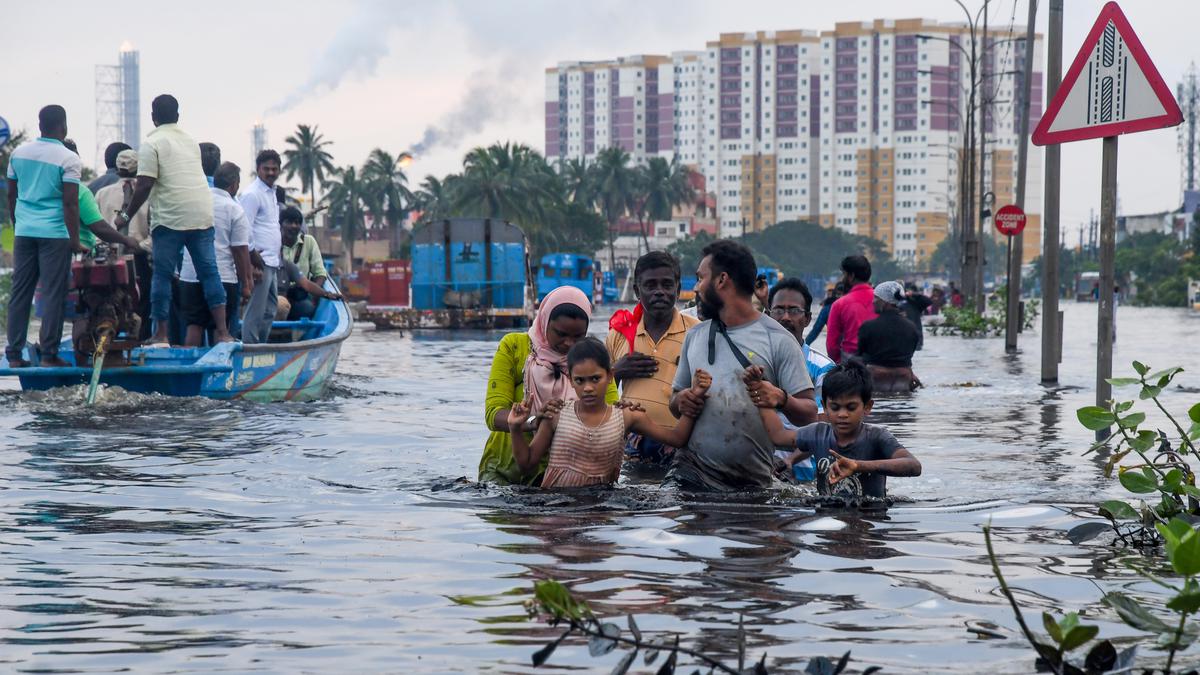Note4Students
From UPSC perspective, the following things are important :
Prelims level: na
Mains level: recurring floods in Chennai

Central idea
The article underscores the recurring floods in Chennai, attributing them to climate change while questioning the extent to which historical human errors and negligence contribute. Emphasizing the need for comprehensive measures, it calls for hydrological mapping, restoration of neglected water bodies, and ecological conservation to achieve flood resilience and sustainable water supply.
Key Highlights:
- Climate Change Attribution: Frequent floods in Chennai, attributed to climate change, raise questions about the impact of historical human errors and the effectiveness of conventional wisdom in flood mitigation.
- Devastating Impact: Neglected irrigation tanks, encroachment on water bodies, and inadequate watershed management contribute to devastating floods, with the 2023 flood considered the worst in 47 years.
- Need for Comprehensive Measures: The need for comprehensive hydro-elevation mapping, restoration of water bodies, and protection of ecological hotspots is emphasized for flood resilience and sustainable water supply.
Key Challenges:
- Historical Neglect: Neglected irrigation tanks and encroachment on water bodies contribute to over 80% runoff, worsening flood impacts.
- Urban Expansion: Rapid urban expansion in Chennai, without considering ecological hotspots, leads to the loss of water bodies and wetlands.
- Inadequate Maintenance: Major waterways and drainage systems suffer from heavy encroachments, sludge deposits, and lack of year-long maintenance.
Key Terms:
- Hydro-elevation Mapping: Mapping of upstream-downstream watersheds to understand water dynamics and drainage systems.
- Ecological Hotspots: Areas with high biodiversity and ecological importance, crucial for flood resilience.
- Storm Water Drain Network: A 2,900-kilometer network designed to manage stormwater runoff in the Greater Chennai Corporation (GCC) area.
Key Phrases:
- “Decode Chennai’s urban and peri-urban hydrology”: Emphasizes the need to understand and intervene in the interconnected hydrological conditions of Chennai.
- “Converting disaster into opportunity”: Encourages turning flood challenges into an opportunity for sustainable water supply.
Key Quotes:
- “Are we hiding behind climate change for all the blunders made so far?”: Questions the tendency to attribute all flood-related issues to climate change.
- “Have we learned any lessons from past flood events?”: Raises concerns about the lack of corrective measures despite repeated floods.
Key Examples and References:
- Chennai’s 3,588 irrigation tanks neglected, contributing to high runoff and flood damage.
- Loss of water bodies and Pallikaranai marsh land due to rapid urban expansion.
- The 2023 flood considered the worst in 47 years, highlighting the escalating impact of floods.
Key Statements:
- “Chennai city and the CMA can be permanently saved from floods”: Encourages a proactive approach to flood resilience through scientific interventions and ecological protection.
- “Hiding behind climate change for all accumulated blunders”: Challenges the attribution of all flood-related issues to climate change without addressing historical neglect and errors.
Key Facts:
- The CMA to be expanded from 1,189 sq.km to 5,904 sq.km as part of Master Plan III, necessitating protection of ecological hotspots.
- Rapid urban expansion in Chennai cited as one of the fastest in the country.
Key Data:
- 4,000 water bodies in the proposed CMA area, requiring protection from encroachments.
Critical Analysis:
- Challenges the effectiveness of conventional approaches and calls for a shift towards scientific and meaningful interventions in water management.
- Emphasizes the need for a balance between urban expansion and ecological conservation for sustainable flood resilience.
Way Forward:
- Comprehensive Mapping: Conduct hydro-elevation mapping to understand water dynamics and drainage systems.
- Restoration and Protection: Restore water bodies to original or increased capacity, protect ecological hotspots, and enforce “no development zones.”
- Sustainable Urban Planning: Integrate ecological considerations into urban planning to prevent irreversible damage from urban expansion.
Get an IAS/IPS ranker as your 1: 1 personal mentor for UPSC 2024
